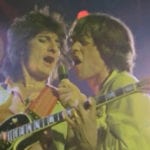 History
History  History
History  Health
Health 10 Everyday Activities That Secretly Alter Consciousness
 History
History Top 10 Historical Disasters Caused by Someone Calling in Sick
 Animals
Animals 10 New Shark Secrets That Recently Dropped
 Movies and TV
Movies and TV 10 Forgotten Realities of Early Live Television Broadcasts
 Technology
Technology 10 Stopgap Technologies That Became Industry Standards
 Weird Stuff
Weird Stuff 10 Wild Facts About Taxidermy That You Probably Didn’t Know
 Travel
Travel 10 Beautiful Travel Destinations (That Will Kill You)
 Miscellaneous
Miscellaneous 10 Modern Marriage Rituals Born from Corporate Branding
 Weird Stuff
Weird Stuff Ten Bizarre Visions of 2026 from Fiction
 History
History 10 “Modern” Problems with Surprising Historical Analogs
 Health
Health 10 Everyday Activities That Secretly Alter Consciousness
 History
History Top 10 Historical Disasters Caused by Someone Calling in Sick
Who's Behind Listverse?

Jamie Frater
Head Editor
Jamie founded Listverse due to an insatiable desire to share fascinating, obscure, and bizarre facts. He has been a guest speaker on numerous national radio and television stations and is a five time published author.
More About Us Animals
Animals 10 New Shark Secrets That Recently Dropped
 Movies and TV
Movies and TV 10 Forgotten Realities of Early Live Television Broadcasts
 Technology
Technology 10 Stopgap Technologies That Became Industry Standards
 Weird Stuff
Weird Stuff 10 Wild Facts About Taxidermy That You Probably Didn’t Know
 Travel
Travel 10 Beautiful Travel Destinations (That Will Kill You)
 Miscellaneous
Miscellaneous 10 Modern Marriage Rituals Born from Corporate Branding
 Weird Stuff
Weird Stuff Ten Bizarre Visions of 2026 from Fiction
10 Party Anthems with Dark Lyrics That Often Get Overlooked
The feeling of singing along without really listening to the lyrics is something we can all relate to. We all want our favorite songs to get us on our feet and ready to party, but sometimes the lyrics don’t quite match the upbeat vibe.
This list will give you the top 10 party anthems with surprisingly dark lyrics that often go overlooked. From old classics to modern-day hits, these songs have a unique mix of upbeat music and lyrics that will make you reflect on the melancholy side of life.
Related: Top 10 Creepy and Dark Ballets
10 “Hey Ya!” by Outkast
In 2003, Outkast released the lead single “Hey Ya!” from their album Speakerboxxx/The Love Below. The track became a global hit, topping the Billboard Hot 100 chart for nine weeks and reaching number one in Australia, Canada, Italy, Norway, and Sweden.”Hey Ya!” made history by becoming the first song to ever reach one million downloads on iTunes and also winning several awards, including a Grammy for Best Urban/Alternative Performance.
However, if you listen past the bright, upbeat rhythm and catchy hook, “Hey Ya!” is a breakup anthem that speaks to the raw emotions of heartache and disappointment. Andre 3000 was very aware and intentional with the song; at the end of the second verse, he even goes so far as to break the fourth wall to address listeners.
“Y’all don’t wanna hear me, you just wanna dance” demonstrates that listeners generally don’t want to think too much about the lyrics and just want to have a good time. The lyrics reflect the complexities of love and relationships through the lens of a couple in a doomed relationship who feels pressured to stay together due to societal expectations and fear of being alone.[1]
9 “Pumped Up Kicks” by Foster the People
Foster the People’s debut single, “Pumped Up Kicks,” was released in 2010 and became a hit the following year. It peaked at number three on the U.S. Billboard Hot 100 and also entered the top 10 in several other countries. The song was praised for its subject matter, and it received “best songs of 2011” accolades from major publications, including MTV and Rolling Stone.
Despite its infectious and upbeat melody, “Pumped Up Kicks” tells a chilling story of a troubled teen planning to take revenge on his bullies through violence. Mark Foster explained that the song was written to draw attention to the prevalence of mental health and gun violence problems among teens.
Toward the end of its run, the song was met with controversy when it was pulled off the airwaves in light of the devastating Sandy Hook school shooting. Out of respect, the band agreed with the decision and highlighted that the song was written to raise awareness and encourage action to stop this cycle of violence.[2]
8 “Electric Avenue” by Eddy Grant
Released in 1983, “Electric Avenue” was a cross-over hit thanks to its seamless blend of reggae, pop, and rock. It peaked at number two on both the UK Singles Chart and the U.S. Billboard Hot 100 a few months after its music video aired on MTV. It has become one of the most iconic songs of the ’80s. Not surprisingly, its influence remains today, with numerous features in films, television shows, video games, and commercials.
The title of the song refers to Electric Avenue in Brixton, South London. Grant first became aware of Electric Avenue during his time acting at the Black Theatre of Brixton. The area was known for its high population of Caribbean immigrants, and Grant was inspired to write the song as a show of solidarity for the Brixton riots that had occurred the year prior.
These riots resulted from tensions over unemployment, racism, poverty, and excessive racist policing. The lyrics were powerful and intended as a wake-up call. At the time, most listeners were unaware of the deeper meaning behind the lyrics.[3]
7 “Papaoutai” by Stromae
“‘Papaoutai” (Papa, où t’es?) is a song by Belgian artist Stromae that translates to “Dad, where are you?” It was released as the lead single from his second studio album, Racine Carrée, in May 2013. The song became a major hit in France, Belgium, and Switzerland. “Papaoutai” was critically acclaimed and has since become one of Stromae’s most successful songs. The music video did an excellent job of bringing the song to life and telling the story, and it has almost reached a billion views on YouTube.
Stromae’s discography could easily fill this list, as his lyrics often tackle weighty topics. Yet, the music always has an uplifting feel to it. The song and video refer to the absence of Stromae’s father, who had little presence in Stromae’s life even before being killed in the 1994 Rwandan genocide. The lyrics address Stromae’s fear of being unable to be an effective father with no memory of ever having one. He also speaks out against men abandoning their families and calls for them to take responsibility.[4]
6 “Chandelier” by Sia
The 2014 single “Chandelier” was an unmissable hit, reaching the Top 5 in more than 20 countries and peaking at No. 8 on the Billboard Hot 100 in the U.S. It has since been certified 9x Platinum in the U.S. and is on the verge of achieving Diamond status. This is an extraordinary accomplishment for such a reclusive artist who never desired to be in the spotlight and a song that only took 15 minutes to write. Sia initially tried to pitch this song to Rihanna, but to her surprise, it was turned down. The music video has been viewed an astonishing 2.5 billion times on YouTube.
The powerful lyrics of “Chandelier” illustrate the dangers of numbing pain and depression through partying and alcohol. The chorus, “Party girls don’t get hurt, can’t feel anything, when will I learn,” reflects a sense of desperation in the singer’s attempt to avoid the sadness of her life. Despite its upbeat tempo and catchy chorus, the song is ultimately an anti-party anthem.
Inspired by Sia’s own journey of sobriety, she wrote the song as a response to the many mainstream pop songs that promote a culture of nonstop partying. While beginning as just another celebratory anthem, the writing process slowly transformed it into a deeply personal song about her battles with addiction. [5]
5 “Gypsy Woman (La Da Dee)” by Crystal Waters
Crystal Waters’s 1991 hit single has become an iconic dance anthem, infiltrating many parties and clubs and cementing its classic status. The song topped the charts in Belgium, Switzerland, and the Netherlands, peaking at number 8 on the Billboard Chart. As successful as the song was, Crystal was concerned that the lyrics were being overlooked. To draw attention to them, she asked the label to put the words “She’s Homeless” on the cover.
Crystal was deeply moved by the story of the homeless woman she used to see singing gospel songs outside the Mayflower Hotel in Washington. She later discovered the woman had recently lost her job and was now resorting to busking to get by.
This shifted the singer’s perspective on homelessness and inspired her to write a song about a woman’s struggle to cope with the harsh realities of life. The song paints a vivid picture of a “gypsy woman” living on the streets with no home and no real sense of belonging. To this day, many listeners overlook the commentary on homelessness when discussing the song’s legacy.[6]
4 “Paper Planes” by M.I.A.
Released in 2007 from M.I.A.’s critically-acclaimed second album Kala, “Paper Planes” is a genre-blending track with elements of electro, hip hop, and pop. The song features an instantly recognizable sample of The Clash’s hit “Straight to Hell.”Despite its upbeat melody and catchy chorus, the song carries a provocative lyrical message about the struggles of immigrants.
M.I.A. raps unapologetically about evading border police, creating counterfeit visas, dealing drugs, and providing a “deadly poison to the system.” The chorus of children singing about shooting you and stealing your money, combined with the menacing backdrop of gunshots and cash registers, make the track even more sinister.
The song attracted controversy for its explicit sound effects and illegal references, with some accusing it of glamorizing criminal acts and treating violence with a careless attitude. However, M.I.A.’s intent was to bring attention to the struggles of immigrants by satirizing the negative stereotypes.[7]
3 “Mamma Mia” by ABBA
ABBA’s classic hit single, “Mamma Mia,” is the best example of their signature sound that blends upbeat music with emotionally charged lyrics. The title is borrowed from the Italian phrase used to express a range of emotions, including surprise, annoyance, fatigue, fear, or excitement. It accurately conveys the sentiments expressed in the song. The song’s popularity was transported into the new millennium with the hit musical-turned-movie Mamma Mia!.
The instantly recognizable catchy melody and lyrics make this song timeless and unforgettable. The music might convey the feel-good vibes of a summer party, yet beneath the surface lies sorrowful lyrics filled with hurt and betrayal. You can hear the desperation and struggle of not feeling strong enough to move on from a toxic relationship. The upbeat disco influence in the song makes it easy to forget the hopelessness and despair in the lyrics.[8]
2 “Pursuit of Happiness (Nightmare)” by Kid Cudi
In 2009, Kid Cudi released “Pursuit of Happiness (Nightmare),” which featured on his debut album Man on the Moon: The End of Day. Unlike most songs on this list, it was not an instant hit and peaked at number 59 on the Billboard chart. However, since its release, it has had a resounding impact on listeners. In December 2022, it was certified Diamond, making it the lowest-peaking single on the Billboard Hot 100 to have achieved this.
The song is a dark and introspective look at Cudi’s struggles with depression and addiction, as well as his search for happiness. Its upbeat tempo and catchy lyrics have made it a staple at bars and parties, especially Steve Aoki’s remix, which was featured in the ultimate party movie Project X.
The song has often been misconstrued as uplifting and glorifying a carefree lifestyle, mostly because of how the first verse lures one in with what sounds like the beginning of a fun night. That is until the lyrics reveal an atmosphere of escapism, loneliness, and existential dread.[9]
1 “Copacabana (At the Copa)” by Barry Manilow
Released in 1978, Barry Manilow’s “Copacabana (At the Copa)” was an international hit, peaking at number eight on the Billboard Hot 100 and reaching the Top 10 in several countries. The disco-influenced classic earned Manilow his first Grammy Award for Best Male Pop Vocal Performance. Prior to the release of the song, most of Manilow’s hits had been ballads. However, the timely release of the song provided a refreshing sound for the disco era.
The title and lyrics of the song refer to the famous Copacabana nightclub. The story follows a showgirl named Lola and her lover, Tony, a bartender at the club. It starts off as an upbeat, fun song but quickly takes a tragic turn one night when a guest becomes aggressively fixated on Lola. Tony steps in to protect her, leading to a deadly fight and his death. Despite its tragic story, “Copacabana” is still often seen as a cheesy party song, and listeners are often unaware of the dark lyrics.[10]








